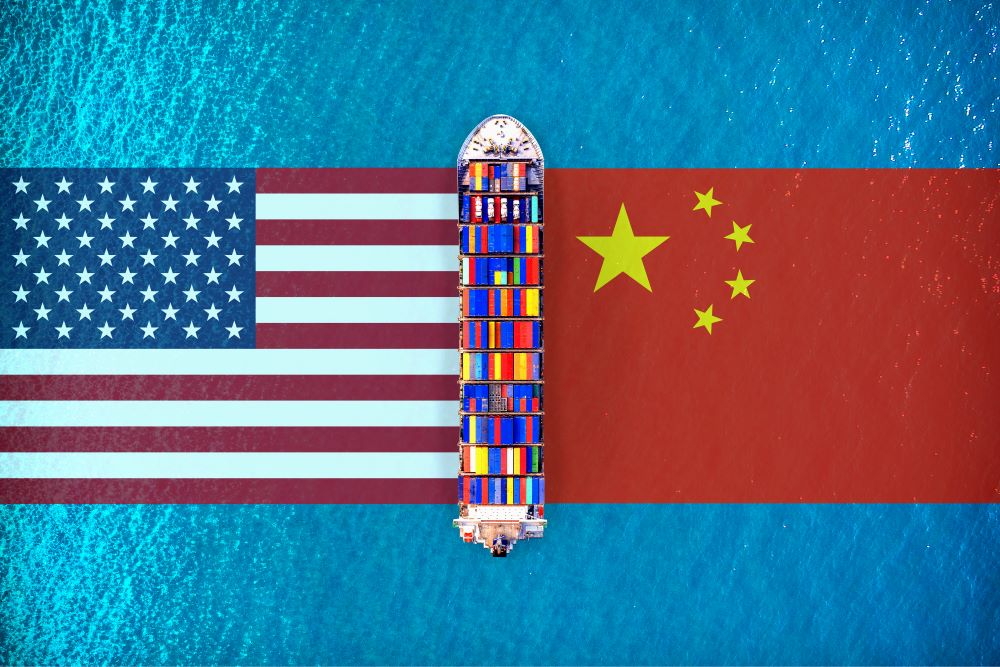
The US and China represent two of the most important players in global trade as the world’s two largest economies.
In the last few years, the relationship between the countries has been strained amid rising tensions, the pandemic and disruptedtrade flows.
The IOE&IT Daily Update here rounds up the latest news in this key economic and political partnership.
Trade hits record high
In spite of troubled diplomatic relations, trade between the US and China hit a new record last year.
Official figures from the US Bureau of Analysis show imports and exports between the two countries totalled $690.6bn (£572.6bn) in 2022, reports the BBC.
According to Politico, the trade figures demonstrate how intertwined the US and China remain despite talks of the need to “decouple” their economies.
Nick Marro, lead analyst for global trade at the Economist Intelligence Unit, told CNN “supply chains are sticky, particularly those linked to China”.
China softening on Taiwan?
Chinese president Xi Jinping could be shifting his hardline approach to Taiwan ahead of the island’s 2024 election that could deliver a pro-Beijing president, reports Bloomberg.
Beijing has also signalled it intends to resume imports from more than 60 Taiwanese food companies that were among exporters it barred last year.
Andrew Hsia, vice chairman of Taiwan’s main opposition party, Kuomintang, will visit China this week and meet its top Taiwan policy-maker, reports Reuters. Kuomintang traditionally favours close ties with China, but strongly denies being pro-Beijing.
The elections are scheduled for early 2024, with incumbent president Tsai Ing-wen of the Democratic Progressive Party being ineligible to seek a third term.
Union address emphasises strength
President Biden used his State of the Union address to warn that the US will protect itself if China threatens its sovereignty, reports the FT.
Biden also said his economic plans, with billions of dollars in subsidies for domestic manufacturing including semiconductor producers, were helping the US win the economic race.
“I will make no apologies that we are investing to make America strong. Investing in American innovation, in industries that will define the future, and that China’s government is intent on dominating,” Biden said, according to the Guardian.
Chips off the menu
US restrictions on exports of critical semiconductor components and technology to China are hitting the Asian nation’s hopes of winning the technology arms race.
Without the complex chips that power everything from cars to smartphones, Jinping’s goal of transforming China into the major global digital power and surpassing the US, could fall apart, reports SCMP.
The US strategy could be boosted by a deal with Japan and the Netherlands for them to impose new restrictions on exports of chipmaking tools to China.
In October, the US imposed sweeping export restrictions on shipments of chipmaking tools to China, but for the restrictions to be effective, Washington needed to bring on board both allied nations.
A Washington official has made the most direct comments to date acknowledging a deal with Japan and Netherlands, according to the Guardian
“We can’t talk about the deal right now,” said Don Graves, deputy commerce department secretary, “but you can certainly talk to our friends in Japan and the Netherlands.”
War in Taiwan?
US military commentators are warning of potential armed conflict with China in the future.
Admiral Harry Harris, a former commander of US forces in the Pacific, told Congress that the US ignores this prospect “at our peril,” as tensions with Beijing remain high, reports Bloomberg.
General Mike Minihan, head of US Air Mobility Command, also warned of potential conflict in a private memo to his commanders seen by the Financial Times.
A US defence official said Minihan’s words were “not representative of the department’s view on China”.
Balloons and other objects
However, the US did shoot down a high-altitude Chinese balloon that was found to be flying over Alaska last week, which some US officials believe was a spying instrument – something which the Chinese have denied.
There have been further unidentified objects shot down over US and Canadian soil in the recent days, while China has also accused the US illegally flying its own high-altitude balloons over Chinese territory, according to CNN.
